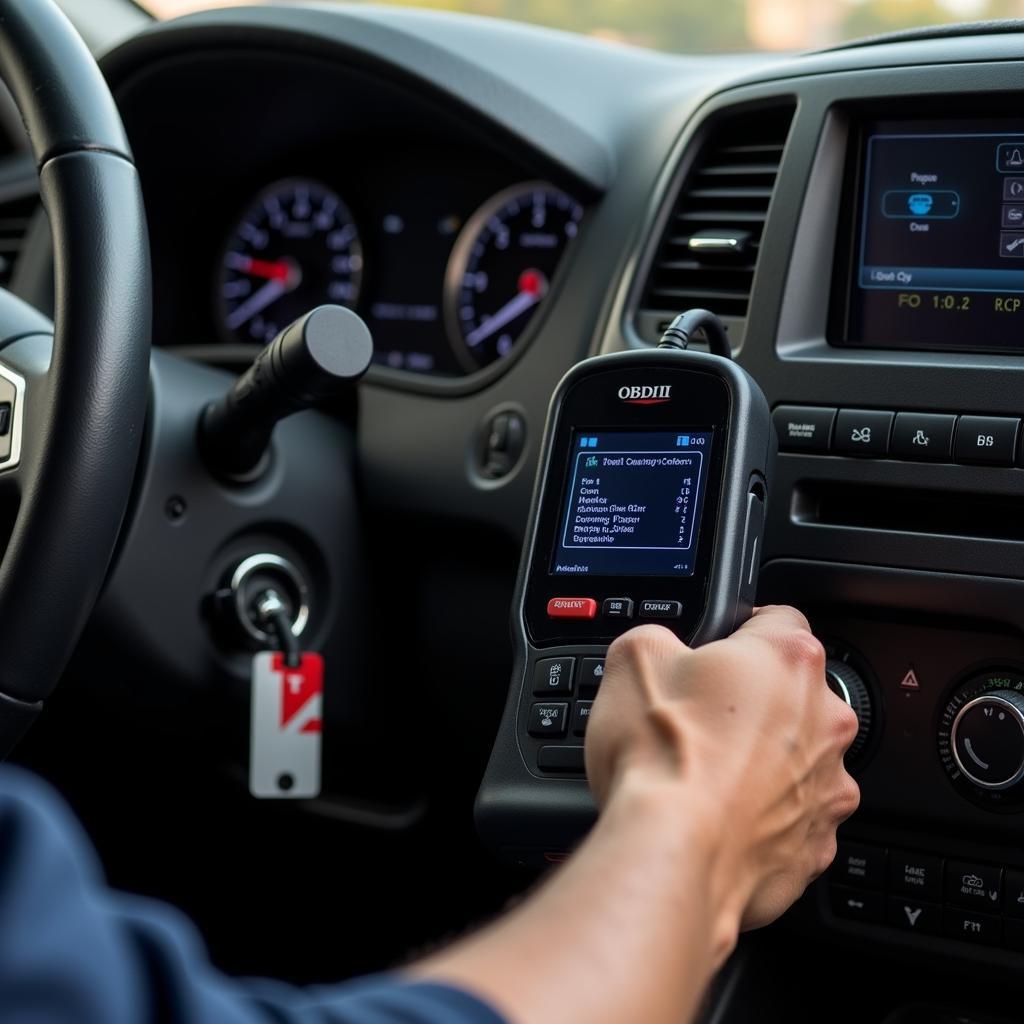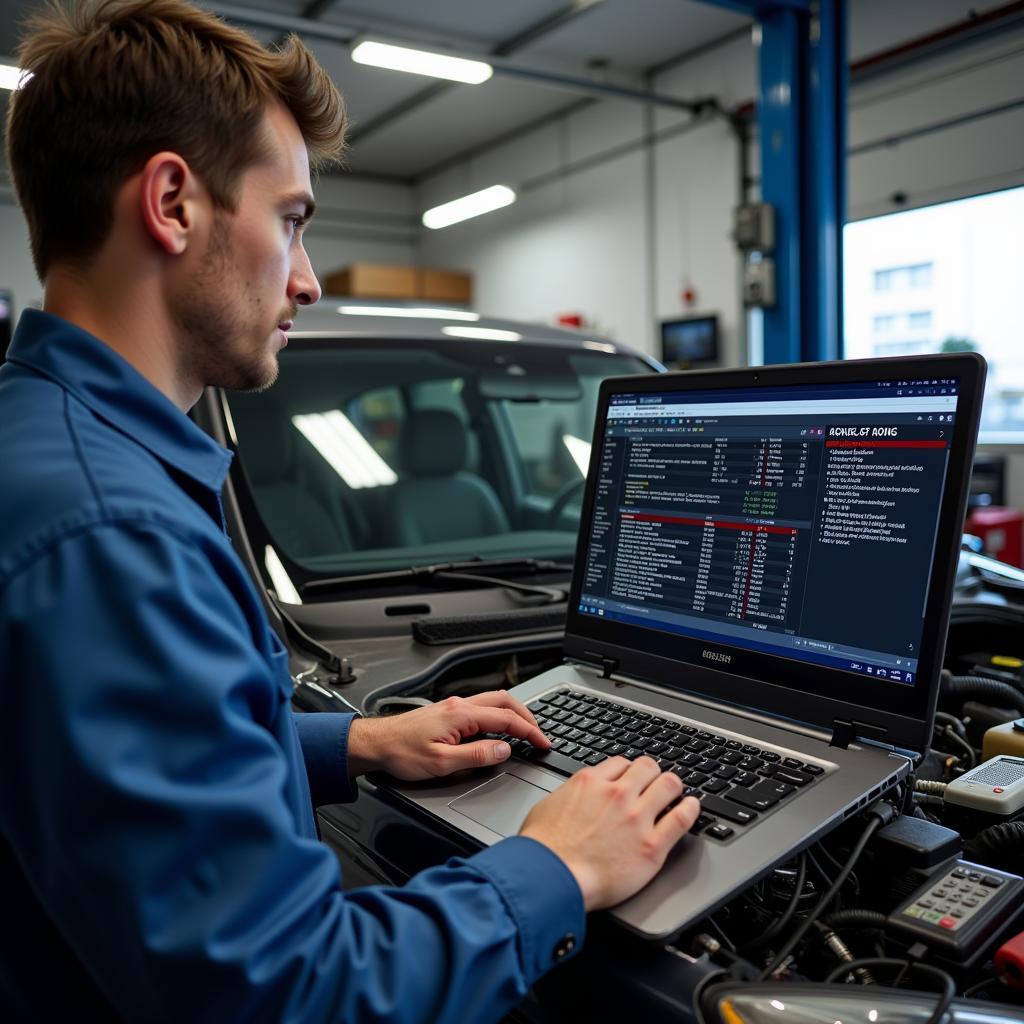A car diagnostic test is like a health check-up for your vehicle. It involves connecting a specialized tool, called an OBD-II scanner, to your car’s computer system to retrieve and interpret data about its performance. This data can pinpoint issues affecting your engine, transmission, exhaust system, and more.
 Car Diagnostic Test with OBD2 Scanner
Car Diagnostic Test with OBD2 Scanner
Understanding the Importance of Car Diagnostic Tests
You might be wondering, “What does a car diagnostic test do, and why should I care?” Well, ignoring potential car problems can lead to costly repairs down the line. Diagnostic tests help you stay ahead of these issues by providing valuable insights into your car’s health.
Think of it this way: imagine ignoring a persistent cough or fever. These symptoms could indicate a minor issue or something more serious. Similarly, your car often gives warning signs – unusual noises, warning lights on your dashboard, or changes in performance. A diagnostic test acts like a doctor’s visit, interpreting these signs to determine the root cause.
What a Car Diagnostic Test Reveals
A diagnostic test delves into your car’s computer system, also known as the Engine Control Unit (ECU), to access stored information. This information comes in the form of Diagnostic Trouble Codes (DTCs). These codes act like clues, pointing to specific areas where your car might be experiencing problems.
Here’s what a diagnostic test can reveal:
- Engine Performance: Identifying issues like misfires, fuel system problems, or oxygen sensor malfunctions.
- Transmission Issues: Detecting problems with gear shifting, clutch engagement, or solenoid operation.
- Exhaust System: Analyzing emissions levels and identifying problems with the catalytic converter or oxygen sensors.
- Braking System: Diagnosing issues with the Anti-lock Braking System (ABS), Electronic Brakeforce Distribution (EBD), or other braking components.
- Airbag System: Detecting faults within the airbag control module, sensors, or wiring.
- Other Electronic Systems: Identifying issues in various electronic systems like power windows, door locks, or the infotainment system.
When to Get a Car Diagnostic Test
Knowing when to get a diagnostic test is crucial. Here are some telltale signs:
- Illuminated Check Engine Light: This is the most obvious sign. Don’t ignore it!
- Unusual Noises: Grinding, squealing, clicking, or knocking sounds can indicate problems.
- Poor Performance: Experiencing decreased fuel efficiency, loss of power, or rough idling? A diagnostic test can help.
- Rough Shifting: Difficulty changing gears or experiencing slipping transmissions needs immediate attention.
- Emissions Test Failure: A failed emissions test often points to issues detectable through a diagnostic test.
 Mechanic Performing Diagnostic Test with Laptop
Mechanic Performing Diagnostic Test with Laptop
Types of Car Diagnostic Tests
Did you know there are different types of car diagnostic tests? Here are the most common:
- OBD-II Scan: This widely used test reads and interprets Diagnostic Trouble Codes (DTCs) stored in your car’s ECU.
- Manufacturer-Specific Scan: Some car manufacturers use proprietary software and tools for more in-depth diagnostics, especially for complex electronic systems.
- Live Data Monitoring: This dynamic test allows mechanics to observe your car’s sensor readings in real time while driving or idling. It’s beneficial for diagnosing intermittent issues or verifying repairs.
Debunking Common Myths about Car Diagnostic Tests
Let’s address some common misconceptions surrounding car diagnostic tests:
- Myth: A diagnostic test will magically fix my car.
- Reality: It’s a diagnostic tool, not a repair solution. It identifies problems, but repairs are necessary to address them.
- Myth: I can only get a diagnostic test at a mechanic shop.
- Reality: While mechanics commonly offer this service, you can also find affordable DIY OBD-II scanners for at-home use.
- Myth: All car problems trigger the check engine light.
- Reality: Some issues might not trigger the light immediately, especially if they’re intermittent or affect systems not directly monitored by the ECU.
How Much Does a Diagnostic Test Cost?
The cost of a car diagnostic test can vary depending on several factors:
- Location: Labor costs can differ between dealerships, independent garages, and mobile mechanics.
- Vehicle Make and Model: Some car brands have more complex systems, potentially increasing diagnostic costs.
- Type of Scan: Basic OBD-II scans are generally less expensive than manufacturer-specific scans.
To get an accurate estimate, it’s always best to contact your trusted mechanic or local repair shops. You can also explore how much does a diagnostic cost for a car for more detailed information.
Empowering Car Owners with Diagnostic Knowledge
Understanding car diagnostic tests empowers you to make informed decisions about your vehicle’s maintenance. Remember, early detection is key to preventing costly repairs and ensuring your car’s longevity.
Here are some additional resources to further enhance your knowledge:
- Learn how to get a diagnostic for a car
- Explore more about what is car diagnostic test
- Find out who does free diagnostics on cars near me
- Get insights into what does a car diagnostic do
By proactively staying informed about your car’s health, you can ensure smoother rides and avoid unexpected breakdowns.

Leave a Reply